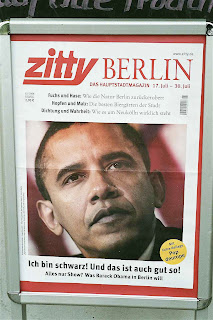Usually, the “fan mile” on the Straße des 17. Juni – a name honoring the violently suppressed uprising of East German workers against the GDR’s Soviet-backed regime in June 1953 – is put up to watch the German national soccer team play in a major championship on huge TV screens. Or to watch a Live-8 Concert when Herbert Grönemeyer and Chris de Burgh sing for a good cause.
 Granted, some of these 200,000 must have been US expatriates. But the majority were Germans celebrating their somewhat bizzare love affair with Barack Obama. “Obama for Kanzler”, Obama for German Chancellor, one sign sticking out of the crowd read in hopeless Denglisch, this mixture of German (Deutsch) and English that has become so common in this country, transcending decent bakeries, zu Deutsch: Bäckereien, into “Back-Shops”.
Granted, some of these 200,000 must have been US expatriates. But the majority were Germans celebrating their somewhat bizzare love affair with Barack Obama. “Obama for Kanzler”, Obama for German Chancellor, one sign sticking out of the crowd read in hopeless Denglisch, this mixture of German (Deutsch) and English that has become so common in this country, transcending decent bakeries, zu Deutsch: Bäckereien, into “Back-Shops”.There are several reasons why Germans tend to feel so strongly about US elections in general, and US elections with charismatic candidates (Clinton – eh, Bill –, Obama) in particular. First, we think that after watching “Dallas”, “West Wing” and other trailblazing US soaps on TV for decades, we know America and the Americans better than they know themselves. Second, after two terms of George W. Bush, we think that we’d also vote better in US presidential elections than the Americans themselves.
And last but not least, I’m dead sure there is political romanticism in abundance in this country, even if home-bred political personnel like Angela Merkel (the Conservative Chancellor), Kurt Beck (her Social Democrat partner in an uneasy “grand coalition”) or Oskar Lafontaine (the former-Social-Democrat-turned-populist-figurehead-of-the-extreme-left) somewhat fail to inspire such broad-felt romantic encounters right now.
So, why not put one’s heart out to a charming, good-looking, rhetorically gifted young man aspiring to be leader of the US and, yes, of the so-called free world?! Especially as he is not only the first black guy standing a realistic chance to become President of the United States – therefore being the politically most correct candidate, of course –, but reminds people of JFK on top of everything, whom Germans and especially “Berliners” tend to glorify…
Are those 200,000 (and the rest of us, who at least contemplated going, if only we had had a babysitter), then, would-be believers longing to see a new political messiah, as some media spectators had it all figured out? Can Obama – or: Obamania – inspire some new bonding between Americans and Germans, those estranged allies?
To be honest, the rage about Obama at the Siegessäule reminded me more of the hype around baby polar bear Knut in the near-by Berlin zoo two years ago. People found Knut “cute” and went to see him in droves. Now, people find Obama “cool” and come to see him in the Tiergarten park. Which is a synonym for zoo, by the way.
After all, Obama is a phenomenon, inspiring the bright and the young; making more and more people curious, drawing them to the stadiums in tens of thousands. He is a celebrity, huge scale. “Welcome to the show”, one of his many self-declared helpers covered with “Yes, we can!” stickers, called out to people approaching the stage in Berlin.
But should Obama really become the 44th. President of the United States, people will probably react not much different from the way they did when they came to see Knut, the cute fuzzy baby bear, a couple of month after his international media career had started – and found a dirty, bad-tempered adolescent polar bear instead. “This is not the cute white Knut we used to know”, they protested, turned around, and left.
“This is not the cool black Obama we used to know”, Germans might find, should we look at a President Barack
 Obama in a couple of months. And turn our backs on him, too, sinking back into our good old habit of Politikverdrossenheit.
Obama in a couple of months. And turn our backs on him, too, sinking back into our good old habit of Politikverdrossenheit.Not that he’d care much, probably. But don’t count on promotionally effective pictures of cheering crowds in Berlin any more, Obama, once you step down from the Olympus of celebrity and into the flats of realpolitik!























